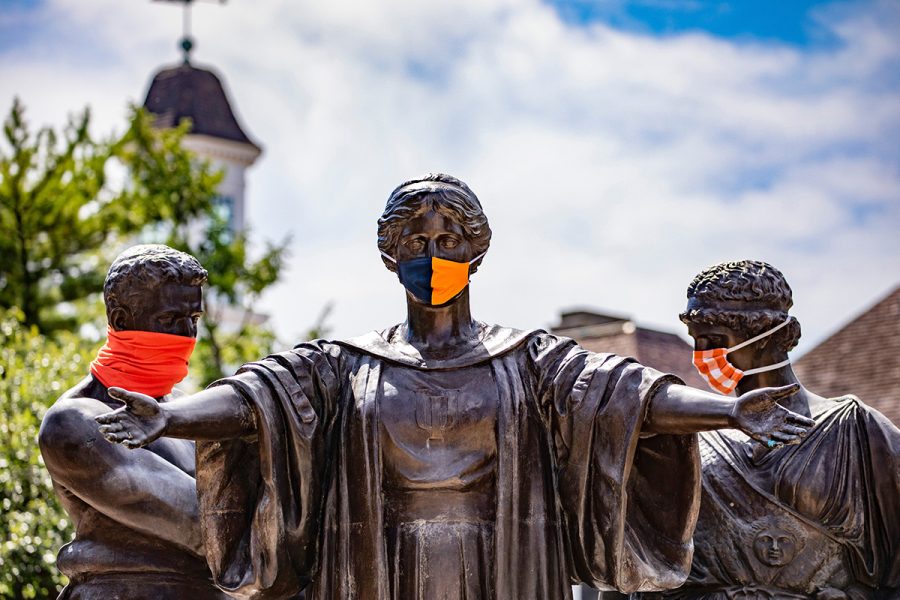Opinion | UI is justified in mandating boosters
Photo courtesy of Fred Zwicky/Illinois News Bureau
Alma Mater greets students wearing a mask as recommendation for all students as they return to campus during the Covid-19 pandemic. Columnist Talia Duffy believes the university has the right in requiring the booster for student and staff safety.
Jan 26, 2022
It’s been a rough couple of years for the University’s public relations team. But despite any backlash that may ensue, the decision to mandate COVID-19 booster shots was the right one. Recent history stands to prove it.
The COVID-19 pandemic forced the University to respond to a virus that, at first, was barely understood. Students were sent home in March 2020, and classes remained remote for months. Once we knew more about the virus and the majority of the student population finally returned to campus, the University established a detailed COVID-19 safety plan, including required biweekly testing.
Of course, with all these drastic changes to campus life came loud objectors that refused to adapt — claiming the new regulations were excessively strict and inconvenient. That outrage alone would be hard enough to deal with.
Compounding the issue, the University would also be held responsible for any outbreaks on campus. Potential criticism that the administration failed to keep their students safe during a pandemic was equally undesirable.
It was a catch-22; an impossible PR disaster waiting to happen.
Get The Daily Illini in your inbox!
But the University’s resilience and continued implementation of these policies paid off; no deaths or hospitalizations within the student body occurred during the 2020-2021 school year. The plan was nationally recognized as a model for outbreak prevention in a university setting.
As vaccines became widely available in the months before the start of the 2021-2022 school year, the University announced a new tier to its safety policy: If students plan to return to campus in the fall, they must be fully vaccinated.
Unfortunately, public skepticism of vaccines — the COVID-19 vaccine especially — continues to be frustratingly common. The University knew that, with this announcement, they would be subject to outrage from any student, parent or staff member that refused to accept the public health policy necessary to keep the University community safe.
But again, the University’s policies worked to prevent any major outbreaks among students during the most recent fall semester. Thanks to the vaccine, the students who got COVID-19 had mild cases, and those around them were not at a high risk of exposure.
The mandate wasn’t too difficult to follow either; as of Oct. 27, 95% of all students reported to be fully vaccinated. This rate, which flew above those of other public universities, demonstrates vaccine mandates produce desired results.
What were those results? We had a little bubble of safety on campus; a place where you can be almost certain that anyone you come across has taken the appropriate measures to protect themselves and others. We had a fall semester that was relatively normal, especially compared to the previous school year. We had in-person classes, a flourishing social scene and active RSOs: all the quintessential aspects of a college experience.
If you haven’t noticed, there’s a pattern here — err on the side of public health, and success will follow. Safety and happiness will follow.
The requirement of the booster for all eligible students and staff is a continuation of this pattern: a reinforcement of the University’s leadership position in the realm of COVID-19 safety.
Things are a bit more complicated now that the Omicron variant has put a damper on the sentiments of security that came with the vaccine. But the fact remains, despite the increase in breakthrough cases, the vaccine protects against severe illness and death — especially with the addition of the booster shot.
With luck, the booster requirement will continue to keep the student population safe and bring us another semester that’s as close to normal as possible, even with the recent increases in cases throughout the country.
We can’t go back to where we were before. In the absence of human interaction, students’ mental health plummeted. Life was gray. Wouldn’t you rather get the vaccine than deal with extended shutdowns, isolating quarantines and a sad excuse for a college experience?
Requiring the booster this early might seem excessive or demanding, especially to those who were apprehensive of the vaccine in the first place or who have fallen into the rut of COVID-19-fatigue. But the University has provided multiple resources for its students and staff to fulfill the mandate. Appointments can be scheduled to receive the booster on campus at the McKinley Health Center.
Getting the booster is as easy as possible, and the potential “downsides” are trivial, inconsequential complaints compared to the fallout that would happen if the proper preventative measures are not taken. We know vaccines are safe. We know they’re effective. We know they’re accessible.
The University’s continued courage in the face of vehement, uneducated criticism is truly admirable. Requiring the booster might be their bravest — and most essential — move yet.
It’s worth it, if only for the hope that after all this time, we can deal the final blow to this virus and live freely once again.
Talia is a freshman in Media.






